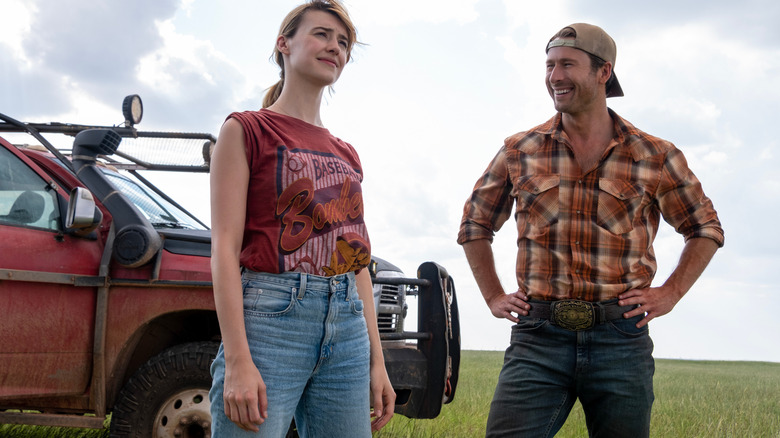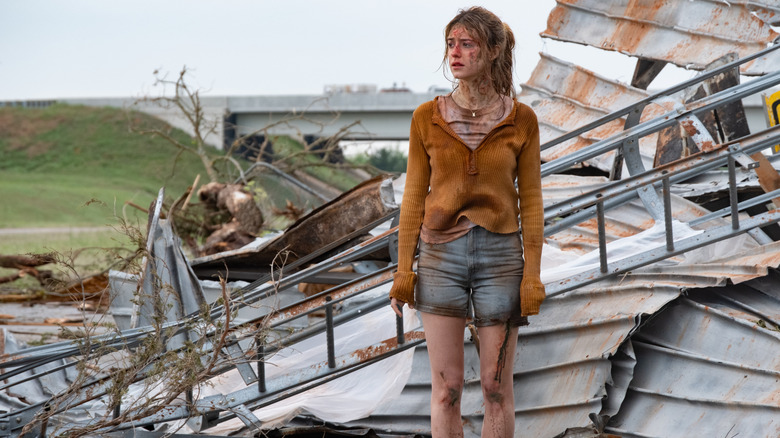Twisters Makes One Glaring Omission (And It's On Purpose)
Warning: The forecast appears to be sunny with a 100% chance of spoilers. Read on only after watching "Twisters."
Ready to re-enter the suck zone? Almost 30 years after the original movie touched down and made box-office history, "Twisters" has arrived to put a new spin (see what I did there?) on the summer blockbuster and reintroduce moviegoers to the biggest cinematic baddie of them all: the weather. The first film told a pretty straightforward story about a motley crew of storm chasers led by Helen Hunt's Jo and Bill Paxton's Bill, who attempt to fend off both rivals and flying cows alike as they track down tornadoes all across the Oklahoma countryside. Despite featuring a grand total of zero legacy-character holdovers and almost no plot connections to what came before, the sequel neatly channels its predecessor's approach with a refreshingly simple, '90s throwback flair, as I wrote in my review for /Film.
But the more "Twisters" keeps things the same as before, the more audiences may end up wondering why it didn't make a major addition to reflect what's gone down in the intervening three decades. For a film that's all about the deadly effects of extreme weather, one pressing question can't help but come to mind: Why doesn't "Twisters" make even a single reference to climate change? It isn't even that much of a divisive issue anymore, seeing how studies show that the vast majority of Americans accept the science and support taking measures to curb our impact on the planet. Naturally, this was brought up to director Lee Isaac Chung in a recent interview with CNN, where he responded:
"I just wanted to make sure that with the movie, we don't ever feel like [it] is putting forward any message."
Here's how that glaring omission hurts "Twisters."
Climate change would've fixed one 'Twisters' plot hole
"Twisters" might not feature any of the characters from the first movie, but one key plot point remains exactly the same — the innocents living in Tornado Alley still don't have any early-warning system set up to provide advanced notice when destructive tornadoes come knocking, and it's up to our main characters to rush headlong into danger so that their research can one day be used to save as many lives as possible. Although the sequel mostly just brushes past this and treats it as a given, it's a bit strange when you stop to think about it. In almost thirty years of scientific progress, we're really no better off than we were in 1996?
As it happens, putting climate change at the forefront of the movie would've easily solved this little conundrum. For as much as various characters talk about an impending "once-in-a-generation outbreak" of tornadoes and how the destruction caused by them is worse now than ever before (a crucial aspect of the film's opening scene is that Daisy Edgar-Jones' Kate Carter vastly underestimates the strength of a tornado, directly leading to tragedy), it almost becomes distracting that nobody ever addresses the elephant in the room. Much like how a warming planet is linked to stronger and more frequent hurricanes, evidence is mounting that climate change is changing the behavior of tornadoes. Even just a throwaway line of dialogue could've explained how humanity's actions have caused tornadoes to grow deadlier in the past few decades and made our usual methods to detect tornadoes outdated (or even completely useless), thus fixing a potential plot hole while also raising the stakes for the action.
Without acknowledging that, "Twisters" implicitly suggests that Jo and Bill's achievements in "Twister" were all for naught.
Ignoring climate change contradicts the themes of 'Twisters'
It should go without saying that failing to be 100% scientifically accurate doesn't make "Twisters" a bad movie — but it certainly makes for a less effective one. For example, a major theme in the sequel revolves around Anthony Ramos' Javi and his choice to chase tornadoes through the support of a corporate benefactor (David Born's greedy, exploiting landowner Riggs). Similar to how Kate wrestles with the guilt of her friends' deaths after making a mistake in the field, Javi struggles to justify his good intentions of gathering information on tornadoes while knowing such data will ultimately be used to victimize survivors. Both characters, in effect, are dealing with their responsibility over inflicting harm on others and figuring out the steps they need to take in order to clean up their own respective messes.
Doesn't that sound an awful lot like our collective culpability in contributing to climate change and the need to take action in order to mitigate the damage we've caused?
While leaving this context out of "Twisters" feels like a contradiction of its own themes, it's worth noting that this decision was likely taken out of director Lee Isaac Chung's hands entirely. Modern studios are notoriously reluctant to make any sort of provocative statement that could hurt a film's mass appeal and, well, the film's projected box office results further support the idea of playing things safe. (Never mind that a movie like "The Day After Tomorrow" came out in 2004, made thinly-veiled references to President George W. Bush's weak climate policies, and still made bank throughout a very successful theatrical run.) In the end, corporate concerns won out over artistic and scientific merit ... which, ironically, is what "Twisters" is all about.
"Twisters" is currently playing in theaters.


